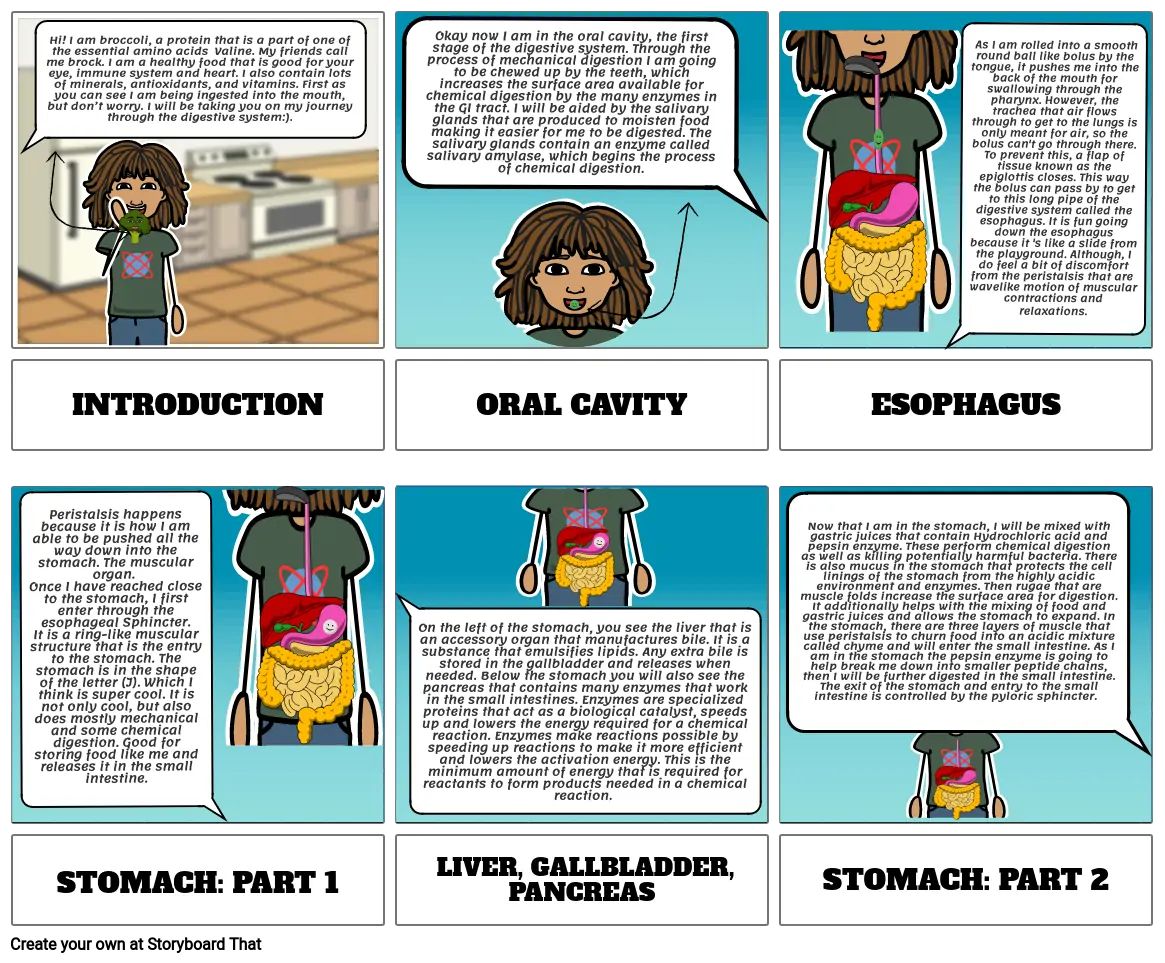The digestive system

Kuvakäsikirjoitus Teksti
- Hi! I am broccoli, a protein that is a part of one of the essential amino acids Valine. My friends call me brock. I am a healthy food that is good for your eye, immune system and heart. I also contain lots of minerals, antioxidants, and vitamins. First as you can see I am being ingested into the mouth, but don’t worry. I will be taking you on my journey through the digestive system:).
- Okay now I am in the oral cavity, the first stage of the digestive system. Through the process of mechanical digestion I am going to be chewed up by the teeth, which increases the surface area available for chemical digestion by the many enzymes in the GI tract. I will be aided by the salivary glands that are produced to moisten food making it easier for me to be digested. The salivary glands contain an enzyme called salivary amylase, which begins the process of chemical digestion.
- INTRODUCTION
- On the left of the stomach, you see the liver that is an accessory organ that manufactures bile. It is a substance that emulsifies lipids. Any extra bile is stored in the gallbladder and releases when needed. Below the stomach you will also see the pancreas that contains many enzymes that work in the small intestines. Enzymes are specialized proteins that act as a biological catalyst, speeds up and lowers the energy required for a chemical reaction. Enzymes make reactions possible by speeding up reactions to make it more efficient and lowers the activation energy. This is the minimum amount of energy that is required for reactants to form products needed in a chemical reaction.
- ORAL CAVITY
- ESOPHAGUS
- As I am rolled into a smooth round ball like bolus by the tongue, it pushes me into the back of the mouth for swallowing through the pharynx. However, the trachea that air flows through to get to the lungs is only meant for air, so the bolus can't go through there. To prevent this, a flap of tissue known as the epiglottis closes. This way the bolus can pass by to get to this long pipe of the digestive system called the esophagus. It is fun going down the esophagus because it 's like a slide from the playground. Although, I do feel a bit of discomfort from the peristalsis that are wavelike motion of muscular contractions and relaxations.
- Now that I am in the stomach, I will be mixed with gastric juices that contain Hydrochloric acid and pepsin enzyme. These perform chemical digestion as well as killing potentially harmful bacteria. There is also mucus in the stomach that protects the cell linings of the stomach from the highly acidic environment and enzymes. Then rugae that are muscle folds increase the surface area for digestion. It additionally helps with the mixing of food and gastric juices and allows the stomach to expand. In the stomach, there are three layers of muscle that use peristalsis to churn food into an acidic mixture called chyme and will enter the small intestine. As I am in the stomach the pepsin enzyme is going to help break me down into smaller peptide chains, then I will be further digested in the small intestine. The exit of the stomach and entry to the small intestine is controlled by the pyloric sphincter.
- STOMACH: PART 1
- Peristalsis happens because it is how I am able to be pushed all the way down into the stomach. The muscular organ. Once I have reached close to the stomach, I first enter through the esophageal Sphincter. It is a ring-like muscular structure that is the entry to the stomach. The stomach is in the shape of the letter (J). Which I think is super cool. It is not only cool, but also does mostly mechanical and some chemical digestion. Good for storing food like me and releases it in the small intestine.
- LIVER, GALLBLADDER, PANCREAS
- STOMACH: PART 2
Yli 30 miljoonaa kuvakäsikirjoitusta luotu

